
An Open Letter to Concerned Americans, Nike Shareholders
and Consumers
by
Vietnam Labor Watch
March 20, 1997

An Open Letter to Concerned Americans, Nike Shareholders
and Consumers
Enclosed you will find our report on Nike labor practices in Vietnam and Nike's own corporate statements and promises. This report is the result of several months of research as well as interviews with 35 Vietnamese workers from Nike factories in Vietnam. Please do compare what Nike said to the reality of Nike workers in Vietnam. We, then, urge you to send the enclosed letters. The first letter is for President Clinton urging him to ask Nike to provide monetary compensation to workers in Vietnam who are owed backpay. The second letter is for Nike’s CEO, Mr. Phil Knight, asking Nike to:
1. Accept proposals by non-governmental organizations to form independent monitoring boards in each country where Nike shoes are produced.
2. Adopt a fair living wage practice for all workers, one that would enable workers to meet basic needs, as well as save for the future. Nike can use independent studies by academics and NGOs to determine living wage standards.
3. Promote conditions at Nike factories conducive to the empowerment of workers. Stop Nike subcontractors from using boot camp techniques in managing factory workers. Adopt a corporate goal of having no tolerance for physical abuse, humiliation, corporal punishment as well as sexual abuse in Nike factories.
4. If Nike agreed with our findings concerning issues related to its violation of Vietnamese minimum wage law, then Nike should provide some forms of backpay to its Vietnamese factory workers to compensate for lost wages that Nike factory workers have endured.
5. Nike should forced all its factories in Vietnam to comply to the recommendations of the HCM City Health department and Bien Hoa Health Department.
Nike is a consumer oriented company and will respond to public pressure. Therefore, your letters to President Clinton and to Mr. Knight will make a big difference in this effort to improve the daily living conditions of Nike factory workers in Vietnam, China and Indonesia. Thank you very much for your help.
Workers cannot live on Nike factory wages
Other Shoe Factories In Vietnam
Nike Labor Practices in the News
Exhibit 1-22
Executive
Summary
This report is the result of a six month effort by Vietnam Labor Watch (VLW) to understand the working conditions of workers at factories in Vietnam that make Nike products. The effort was started in October 1996, after the CBS News program 48 Hours ran a segment detailing the abuse of Nike workers in Vietnam. A group of Vietnamese Americans, deeply disturbed by the report, decided to contact labor groups and journalists in Vietnam to verify the report, to meet with Nike officials to discuss the problems and to organize a group called Vietnam Labor Watch to monitor the issue on an ongoing basis.
From March 2-18, 1997, at the invitation of Nike, Vietnam Labor Watch traveled to Vietnam to visit the factories. We met with workers, shoe manufacturing executives, labor union officials, union representatives, legal experts and foreign investment experts in Vietnam. In addition to the official factory tour of the Sam Yang plant, we did surprise visits to Sam Yang and three other plants that produce Nike shoes – Pouchen, Dona Victor and Tae Kwan Vina. We conducted in-depth interviews with 35 Nike shoe factory workers outside their respective factories.
This study covers the following issues: labor law violations, wage, working conditions, health and safety practices, and sexual harassment. The study also compares what Nike told the American consumers about its labor practices versus what VLW has found in Vietnam.
We are glad that Nike is providing needed jobs in Vietnam, but we are deeply concerned about the company’s labor practices. Nike contractors are exploiting the Vietnamese workers in many areas, including wages, working conditions, health and safety practices. Nike has a fine Code of Conduct but this Code of Conduct is being violated consistently by Nike contractors in Vietnam. While Nike claims it is trying to monitor and enforce its Code, its current approach to monitoring and enforcement is simply not working.
A simple story illustrates this fundamental problem. On the day we made an official visit with Nike representatives to the Sam Yang plant in Ho Chi Minh City, we found that the doors to the six factories of this facility were wide open, as stipulated in the fire codes. However, on the day, we made a surprise visit to the same facility, we found three factories had their doors closed, while workers were still working inside. A small industrial fire in any of these factories could easily lead to the loss of many lives.
Under the current system, Nike has no way to ensure that its contractors abide by its Code of Conduct. There are not enough Nike expatriates or employees in all of Nike’s various departments in Vietnam to ensure that Nike contractors are complying with the code of conduct on a day-to-day, shift-to-shift basis. Auditing is also not adequate. Any visit, audit or study to find out about working conditions through worker interviews within the confines of the factory will simply be inaccurate. The workers are under a constant threat of retaliation and would not reveal their true feelings to anyone while they are inside the factory. To be accurate, any study or audit must interview workers outside the factory and must be done by a neutral party who could guarantee the anonymity of the workers.
We found that Nike subcontractors violated many critical Vietnamese labor regulations. We found violations of the laws covering overtime wages, night shift wages, and Sunday wages. We were shown pay stubs with such irregularities in compensation that they suggest a systematic form of wage cheating. We found many workers who received below minimum wage during the first three months of employment, which is another violation of Vietnamese law. We also found that in 1996, many workers worked over the legal maximum of 200 hours of overtime per year. In 1997, we already found several workers working such long hours of overtime that they were reaching the yearly limit within the first two months of 1997!
Over 90 percent of the Nike workers in Vietnam are women, and most of them are between the ages of 15 and 28. A uniform complaint among the women we interviewed was that they were not being paid a livable wage. The daily wage is approximately $1.60 and the cost of three simple meals is $2.10 per day. The women told us that they literally have to make a daily choice between eating a balanced meal or paying rent for the single rooms that most of them rent out. Ninety percent of the workers we interviewed told us that they received extra help in terms of finance, food, or housing from their families to make ends meet. Most of the women are from the countryside, and all the women we interviewed told us that they cannot afford to save money to send back home to their families.
The treatment of workers by the factory managers is a constant source of humiliation. We found that verbal abuse and sexual harassment are frequent, and corporal punishment is often used. During our two week visit, 56 women workers at a Nike factory were forced to run around the factory’s premise because they weren’t wearing regulation shoes. Twelve of them suffered shock symptoms, fainted during the run and were taken to the hospital. This deplorable event occurred on International Women’s Day, an important holiday when Vietnam honors its women. This abuse of workers reflects Nike’s inability to enforce its Code of Conduct. It took place during a period when Nike knew that Vietnam Labor Watch was in Vietnam investigating Nike labor practices. During this same two week period, the workers at another Nike factory conducted two work stoppages, one of which lasted for three days.
Several factory rules in place violate sensibilities and indeed, human dignity. Workers cannot go to the bathroom more than once per 8-hour shift and they cannot drink water more than twice per shift. Forced and excessive overtime to meet high quotas is currently the norm at Nike factories. During January 1997, we found workers who worked over 80 hours of overtime, and in February, which was a short month due to the national four-day holiday for Lunar New Year, they were forced to work over 70 hours of overtime.
Many health and safety standards in Vietnam are ignored by Nike factories. In March 1997, we found that a Nike factory had not even implemented a single health and safety recommendation from a list of many made in September 1996 by the Ho Chi Minh City Health Department. It is a common occurrence to have several workers faint from exhaustion, heat and poor nutrition during their shifts. We were told that several workers even coughed up blood before fainting. The medical facilities at the factories we visited were inadequate. The Sam Yang’s medical facility is only staffed with two nurses for approximately 6000 employees. There is only one doctor who works for two hours a day, even though this factory operates 20 hours per day.
Given the distressing conditions, the relationship between factory managers and worker is extremely tense. We believe if this antagonistic relationship continued, there could well be very serious clashes.
VLW believes that Nike can only enforce its code of conducts for its factories through the use of monetary fine and independent monitoring. Nike needs to adopt a policy of zero-tolerance for corporal punishment and physical abuse of its workers just as it has a policy of zero tolerance for poor quality shoes. Nike can only improve the working conditions at Nike factories in Vietnam by working with the Vietnam General Confederation of Labor and the labor union representatives at the factories. Nike also needs to consult with other shoe manufacturers in Vietnam who have managed to produce high quality shoes for other US shoe companies while providing higher wages and offering much better working environment than Nike factories in Vietnam.
Nike Claims:
1. In the Nike Production Primer, Nike stated that workers in its factories in Vietnam "can earn triple the wage offered in state-run factories" (p. 2.8)
2. The first rule of Nike's code of conduct is that "(Subcontractor/supplier) certifies compliance with all applicable local government regulations regarding minimum wage; overtime; child labor laws…"
Reality:
Nike might claim that new workers are paid a lower wage because Vietnamese law allows for a training or probationary wage that is less than the minimum wage. Vietnam's legal code, however, specifies that the training wage can be paid only for a "probationary period" of 30 days for jobs requiring high school education and 6 days for jobs requiring less than high school education (under Article 32 of the Labor Code of June 23 1994 and Article 5 (2) of Decree 198-CP of Dec 31, 1994). Of the 35 workers that Vietnam Labor Watch interviewed, only 8 of them finished high school. In terms of training, the majority of shoe factory jobs other than stitching and sewing require about one week of training, according to the workers we interviewed. We also were informed by the Vietnamese General Confederation of Labor as well as Ho Chi Minh City Confederation of Labor that the legal definition of training and probationary wage under the Vietnamese legal code is one and the same.
Nike contractors might also claim that the workers, during the first three months, are considered students receiving a technical or vocational education and therefore can be paid below the minimum wage. We firmly believe that this is just an excuse to squeeze further profits out of these workers. Nike workers are not receiving a formal technical education or vocational training. There are no classroom facilities in the factory and no educational materials are provided to the workers. The proof that Nike factory jobs require no formal training is the fact that Nike factories currently employ workers on the assembly lines who only have a 9th grade education, and new workers are usually immediately placed on the assembly line after only a few hours of training These "students" also work many hours of overtime, just like regular workers. If a worker is good enough to virtually immediately start producing shoes and to work many hours of overtime, then they should get the wage of a regular employee.
Our pay stub records (exhibits 6 to 12) show that one Nike factory worker worked 238 hours of overtime from April 1996 to October 1996. Exhibits 13 to 17 show that another worker worked 236 hours of overtime from May 1996 to October 1996. Both of these women work on different assembly lines, and said they were forced to work this much overtime. Since each assembly line involved 50 workers, additionally there must be at least 98 other workers who were forced to work over the legal overtime limit. We found one pay stub indicated that a worker has worked over 73 hours in February 1997 alone (exhibit 19), and 84 hours of overtime, including three Sundays, in January 1997 (exhibit 18).
For example, we have two pay stubs for the month of February 1997 from two workers (exhibit 5 and exhibit 19). They told us that during February, they worked many hours of overtime, including double shift days, several Sundays, one worked over 100 hours of overtime and the other worked over 60 hours of overtime. According to these pay stubs, both workers worked 29 days in February, but there are only 28 days in February 1997. During the month of February, the workers were supposed to have received 4 days off for the Lunar New Year. Either they did not receive the holidays according to the law or they did not receive the correct overtime compensation. Another legal violation is that if they have worked the entire month of February 1997, they must have worked four Sundays but the pay stubs did not indicate any Sunday hours.
Over 60% of the workers we interviewed complained about not being paid overtime even when they worked overtime. They told us that in some parts of the factories, each assembly line is assigned a specific daily quota, and if the workers do not meet this quota, then they have to work extra hours until they meet the quota—without getting overtime pay.
Workers cannot live on Nike factory wages
Nike Claims
1. Nike has agreed to "…only do business with partners whose workers are all cases employed voluntarily, not put at risk of physical harm, fairly compensated…, and not exploited in any way." (Athletic Footwear Association's Statement of Guidelines on Practices of Business Partners, signed by Nike, 3/93)
Reality
Nike Claims
1. Nike has agreed to "…only do business with partners whose workers are all cases employed voluntarily, not put at risk of physical harm, fairly compensated, allowed the right of free association and not exploited in any way." (Athletic Footwear Association's Statement of Guidelines on Practices of Business Partners, signed by Nike, 3/93)
2. Nike claims that it has employees on site daily at the factory and enforced the Memorandum of Understanding. (Nike Production Primer, Nike Consumer Affair, 1996)
3. At the shareholder meeting on Sept 16, 1996, Nike CEO Phil Knight said about reports of physical abuse from Vietnam Nike factories (from transcript of Nike shareholders meeting),
We had a situation that got some publicity more in Asia maybe than in the United States, where we had a -- a stitching room floor lady, a Korean floor lady in -- in one of the Vietnamese factories, you know, hit a Vietnamese stitcher on the -- on the arm with an upper. And an incident was made out of that.
The -- The Korean floor lady was sent back to Korea and doesn't work in that factory anymore. It's basically an enforcement of our (quote) "conduct."
Reality:
Nike Claims
1. Nike has agreed to "…only do business with partners whose workers are all cases employed voluntarily, not put at risk of physical harm, fairly compensated, allowed the right of free association and not exploited in any way." (Athletic Footwear Association's Statement of Guidelines on Practices of Business Partners, signed by Nike, 3/93)
Reality:
Nike Claims
1. "Nike expatriates aggressively work to ensure our subcontractors follow our Memorandum of Understanding..." (Nike Manufacturing: Perception vs Reality. Nike Consumer Affair, 1996)
2. At the shareholder meeting on Sept 16, 1996, Nike CEO Phil Knight also commented on a report of sexual abuse at Nike factories in Vietnam. This is what Mr. Knight said (from transcript of Nike shareholders meeting),
Fairly recently in Vietnam, that basically there was a situation on the night shift where four of the woman th-- who were in the stitching fell asleep. And -- and the night watchman who again was Korean in coming through the room, two of them woke up and fled the room. And he shock the other two. And in the shaking of one of 'em, there was perhaps some misappropriate behavior. And then he touched a part that he should not have.
That basically she protested. And -- and basically, it comes about as close as you can get to sexual harassment in U.S. terms, as you can get. The night watchman was sent back to Korea. And - essentially, trying to rectify the situation. However, it was reported in one of the Vietnam -- at least one of the Vietnamese newspaper as a rape.
Reality:
At 4:40 am on the morning of August 18, 1996, Kim Sung Rat went to inspect passing an area where there were four Vietnamese female workers working in the computer embroidery room. Kim Sung Rat let two of the workers take a break and called the other two female workers, NTH and NTVP, to come to the storage area at the farthest end of the factory where there was no one working, about 50 meters away from the computer room. Here Kim Sung Rat called NTVP into the storage area and made a gesture that she should take off her shirt. After that, Rat tore the shirt of P and felt her up. P ferociously resisted, and was able to run and escape.
At that moment Rat grabbed a hand and pulled H into the room. Again with a very obscene action, he rubbed her chest, pulls the pants zipper of H, and rubbed her private parts. After that, Rat made a sign by his finger in a very obscene manner indicating sexual intercourse. Although weaker than P, and being unable to escape nevertheless, H ferociously resisted. Being able to guess the activity or Rat in the storage room, as he had done with her, Miss P had run to call the guards, and R was caught in the act.
Questioner: (to NTH) Can you tell us, after this took place, on the side of the company, what was their manner?
NTH. After this took place, the leadership of the company put forth their "separate condition" with me and P. The company agreed to compensate us in order to smooth over this matter. Two times they gave to me and to P, each of us, an envelope full of money in order to buy us off and smooth over the action of this expert Kim. But we refused. I answered them, we will not for money sell our dignity or our honor.
Other Shoe Factories In Vietnam
For comparative purpose, we also interviewed 25 workers at two other shoe manufacturing companies in Vietnam: Thai Binh and Hiep Hung. Thai Binh is privately owned and Hiep Hung is a state enterprise. Both of these companies are currently producing shoes for Reebok, as well as other European shoe companies. Both are employing from 4000 to 6000 workers each. We found that the working conditions and even the wages are better than those found in Nike factories. The Thai Binh factory is in Song Be province, which has a lower minimum wage than Ho Chi Minh City. Yet the factory workers there receive a higher wage than those in Nike factories.
Just from a few visits, it is easy to see the difference in treatment of workers as soon as one walks into these factories. The workers smile at the guests; they are working but they are relaxed, while workers in Nike factories are tense, sheepishly looking at the guests. At Thai Binh and Hiep Hung factories, several workers started conversations with us when we walked through the factory floor. At Nike factories, the workers did not even want to sit next to us during lunch.
During lunch at Thai Binh, workers and managers all share the same table, talking and eating. At Nike factories, the managers have a separate dining room. At the end of the shift, one can also see another major difference in treatment of workers. At Thai Binh, the workers simply walked their bikes and packages out of the factory. At Nike’s factory Sam Yang, the workers are searched if they carry any bags because the factory management does not trust its own employees .
In terms of wages, both of these Vietnamese shoe factories offered higher pay than Nike factories. Thai Binh, in Song Be district (a lower minimum wage than Ho Chi Minh), offered $52 US per month. At Hiep Hung, the entry level wage is $65 US per month.
Nike Labor Practices in the News
Vietnam Labor Watch firmly believes that a modern, high-tech shoe factory can—and must—be managed without practices that are exploitative and abusive to factory workers. Corporal punishment and severe disciplinary measures should not be necessary to produce high-quality shoes. Labor practices of the 19th century should no longer be tolerated at the end of the 20th century, especially by a U.S. corporation that claims the moral high ground, projects a progressive image, and is extremely wealthy.
We believe that Nike is willing to change its practices, and we also believe that Nike has the power to make its contractors rectify their labor practices. In a spirit of cooperation, so that we can improve the daily lives of the workers, we recommend that Nike take the following steps in Vietnam:
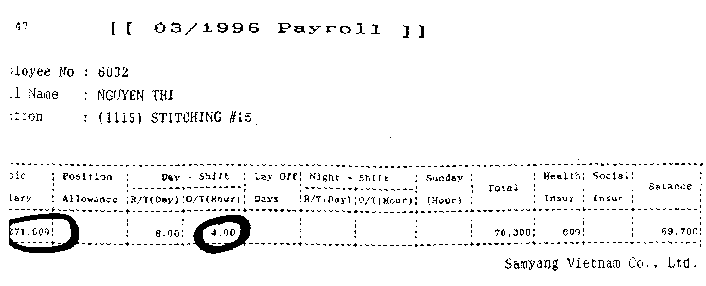
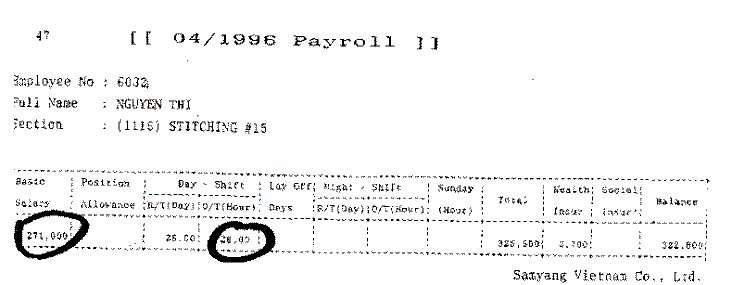
Exhibits 1 & 2 combines together demonstrate that Nike’s subcontractor, Samyang Vietnam Co., Ltd violated the minimum wage law of Vietnam. The minimum wage in Vietnam for the period of March and April 1996 is $35 USD or 387,000 dong (VND). These two exhibits demonstrate that this worker, employee no. 6032, received a wage 271,000 VND for 32 days. According to Vietnamese law, Nike subcontractor can pay a wage that is less than the minimum wage for a trial period of 6 days. Therefore, Nike factory definitely owed at least 26 days of backpay to this worker.
Additionally, Exhibit 1 shows that employee 6032 worked 4 hours of overtime for March 1996 and Exhibit 2 shows that the same employee worked 20 hours of overtime for April 1996.
Exhibit 3, 4 & 5 also demonstrate that Nike’s subcontractor, Sam Yang Vietnam Co, Ltd. violated the minimum wage law of Vietnam for the month of November, December 1996 and February 1997. These three exhibits show that employee no 6111 received a wage of 387,000 VND for 3 months. VLW could not obtain a paystub for Jan 1997., nevertheless we can easily assume that this worker received the same wage as December 1996. The minimum wage in Vietnam since July 1996 is $45 USD.
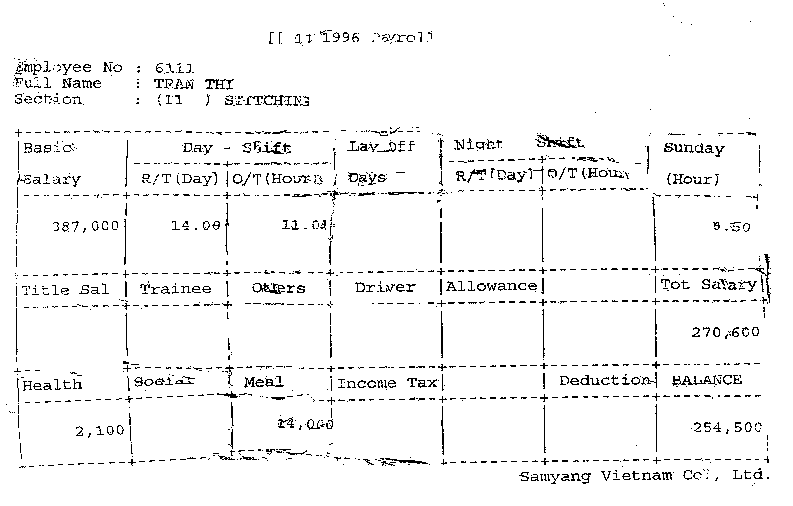
Exhibit 3 demonstrates that in Nov. 1996, employee 6111 received a basic salary of 387,000 VND which is below the minimum wage of Vietnam ($45).
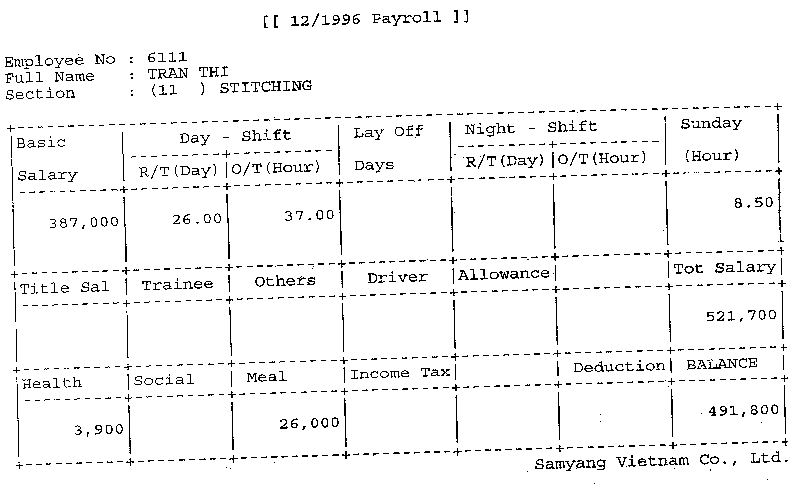
Exhibit 4 demonstrates that in Dec. 1996, employee 6111 received a basic salary of 387,000 VND which is below the minimum wage of Vietnam ($45 USD).
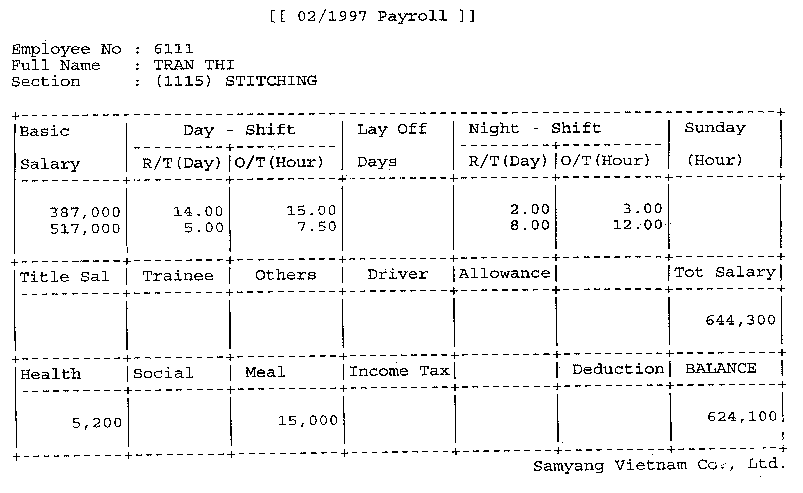
Exhibit 5 demonstrates that in Feb 1997, employee 6111 received a salary of 387,000 VND for 16 days of work which is below the minimum wage of Vietnam ($45 USD). There are other irregularities with this paystub. Please refer to exhibit 19 for explanation.
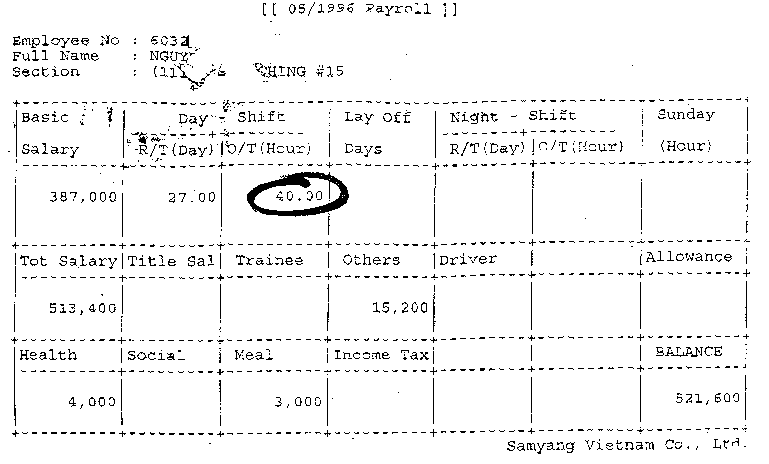
Exhibit 6 shows that employee 6032 worked 40 hours of overtime in May 1996.
Exhibit 7 shows that employee 6032 worked 36 hours of overtime in June 1996.
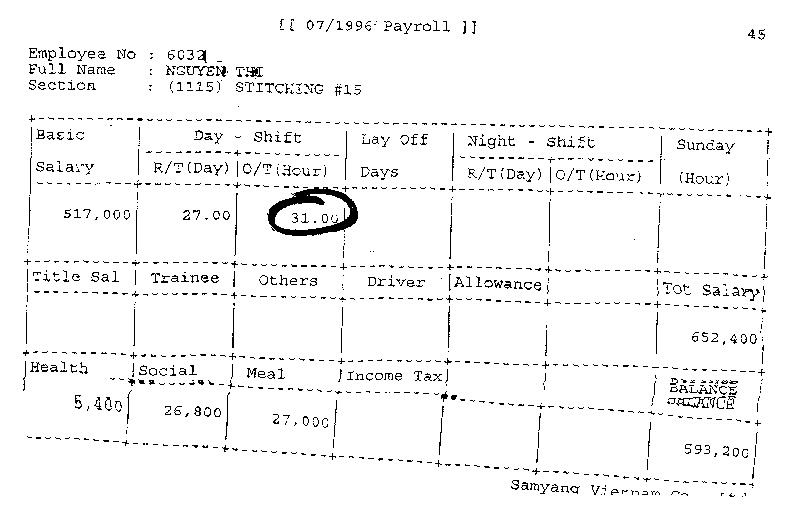
Exhibit 8 shows that employee 6032 worked 31 hours of overtime in July 1996.
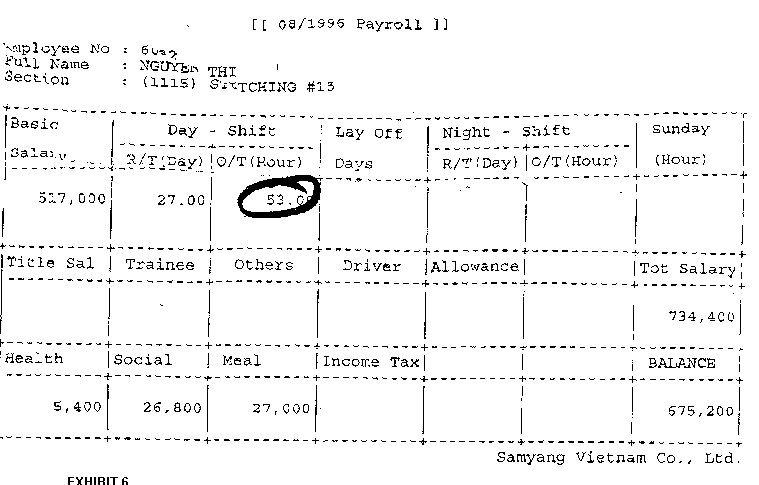
Exhibit 9 shows that employee 6032 worked 53 hours of overtime in August 1996.
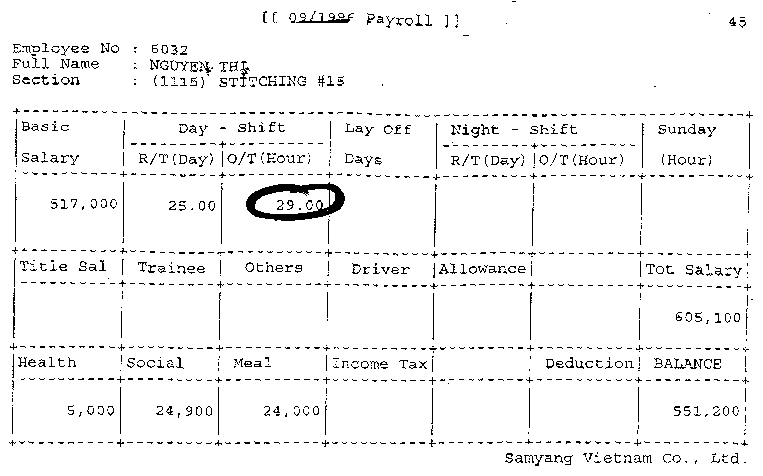
Exhibit 10 shows that employee 6032 worked 29 hours of overtime in September 1996.

Exhibit 11 shows that employee 6032 worked 21 hours of overtime in October 1996.
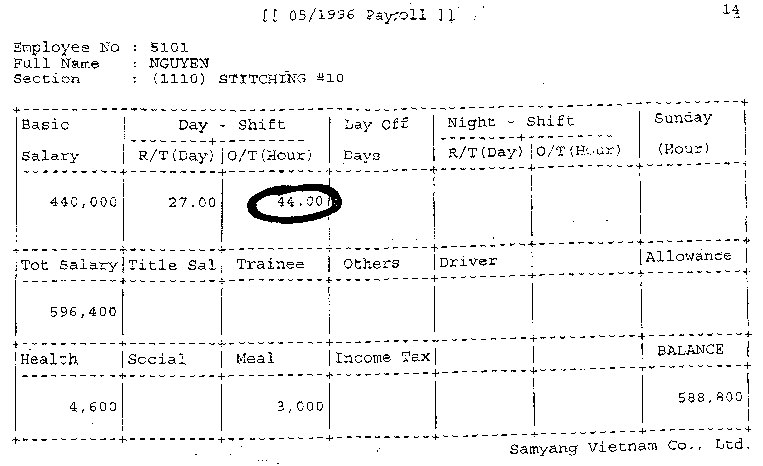
Exhibit 12-17 shows that employee 5101 worked 236.5 hours of overtime from May 1996 to October 1996. The Vietnamese legal limit of overtime is 200 hours per year.

Exhibit 13 shows that employee 5101 worked 36 hours of overtime in June 1996.
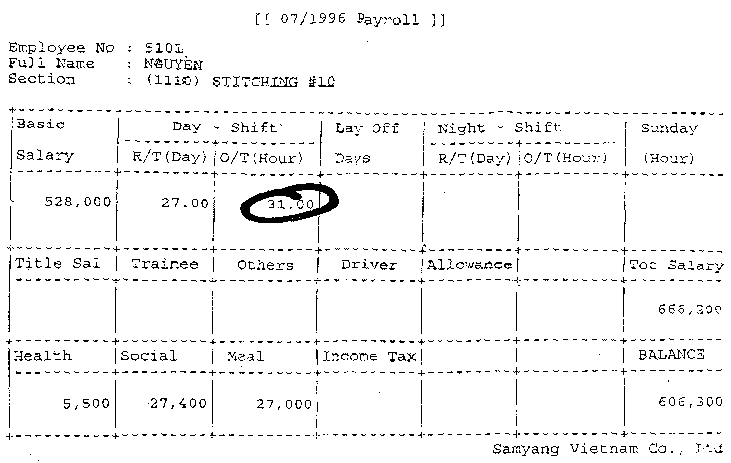
Exhibit 14 shows that employee 5101 worked 31 hours of overtime in July 1996.

Exhibit 15 shows that employee 5101 worked 55 hours of overtime in August 1996.
Exhibit 16 shows that employee 5101 worked 31 hours of overtime in September 1996.
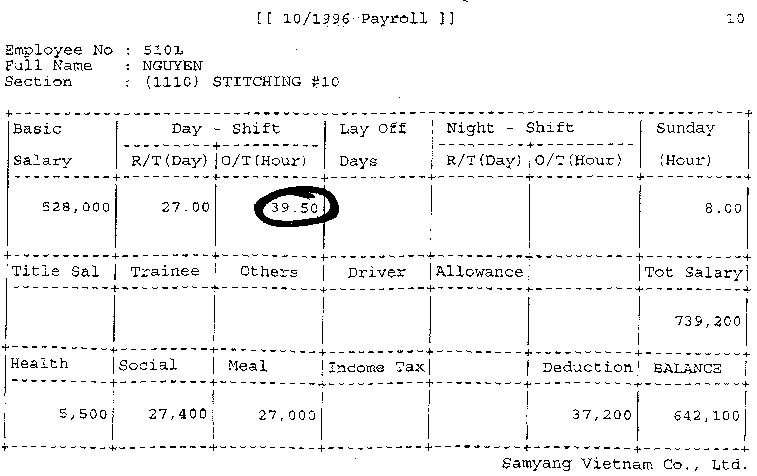
Exhibit 17 shows that employee 5101 worked 39.5 hours of overtime in October 1996.
Exhibit 18 shows that employee 5101 worked 84 hours of overtime including 21 Sunday hours in Jan 1997
Exhibit 19 and exhibit 5 have many irregularities suggesting a systematic form of wage cheating. Both paystubs indicate that both employees worked 29 days in February 1997 but there were only 28 days in February 1997. If the workers have worked for the entire month of February, then they must have worked 4 Sundays, yet the paystubs indicate that they did not receive any Sunday pay (2 times the basic salary). If the workers have worked two shifts on some days, then the second shift should be compensated as overtime pay and not as night-shift pay. Overtime pay is higher, 1.5 times the basic salary, than night shift pay, 1.3 times the basic salary.
In February, there is a 4 day national holiday for the Lunar New Year. If the workers have worked during the holidays, they did not receive holiday pay which is 2 times the basic salary. The worker in exhibit 19 insisted that she got 4 days off for the Lunar New Year, and she worked at least 100 hours of overtime including several Sundays, and several days of double shifts. Exhibit 19 indicates that she only worked 73 hours of overtime.
Exhibit 18 and 19 together demonstrates that this one worker has already worked over 157 hours of overtime during the first two months of 1997. The maximum overtime limit for Vietnam is 200 hours per year. After two months in February 1997, this worker is reaching the legal maximum limit.
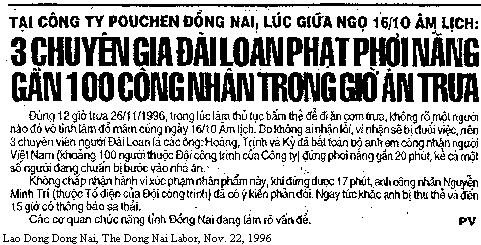
Translation: The Lao Dong Dong Nai ( Dong Nai Labor), November 22, 1996, page 1
At Pouchen Company, Dong Nai, at mid-day 10/16 Lunar Calendar
3 Taiwanese technical experts punished about 100 employees by forcing them to stand in the sun during lunch
Exactly at 12 noon, 11/26/1996, during the process of punching lunch tickets, it was not sure who but someone accidentally spilled a tray on the altar to commemorate October 16th, Lunar calendar. No one admitted to the mistake, afraid of being fired, 3 Taiwanese technical experts: Hoang, Trinh and Ky forced the entire group of Vietnamese workers (approximately 100 workers of in the construction crew) to stand in the sun (sun-drying) for 20 minutes, including workers who were getting ready to eat lunch.
Refusing to accept this kind of humiliating punishment, after 17 minutes, Mr. Nguyen Minh Tri (a worker in the construction crew) expressed his objection to the indignity. Immediately Mr. Tri employee card was taken and he was fired at 3 pm.
The labor officials at Dong Nai is still trying to clarify the matter. PV
Translation:
Nguoi Lao Dong (The Worker), March 12, 1997, Page 2
Pouchen Co. (Dong Nai)
Punish women workers to run 4 km
70 women workers were punished, 12 fainted on the spot. Ms. Hsu Jui Yun was held by authority. President of Confederation of Labor in Dong Nai proposed: this situation must be judged according to the law.
The "Gift" for March 8 (International Women’s Day) from Pouchen Company: Humiliating women workers.
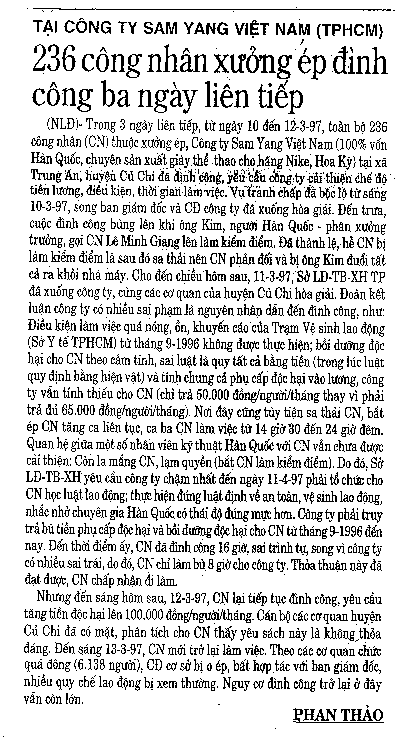
TRANSLATION
Nguoi Lao Dong, (The Worker),
March 14 1997, page 2
Subhead:
At Sam Yang Vietnam Company (Ho Chi Minh City)
Headline:
236 workers from the pressing factory conduct a work stoppage for three days in a row.